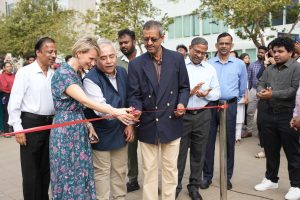- Sustainable Development in the BRICS Economies September 25, 2025
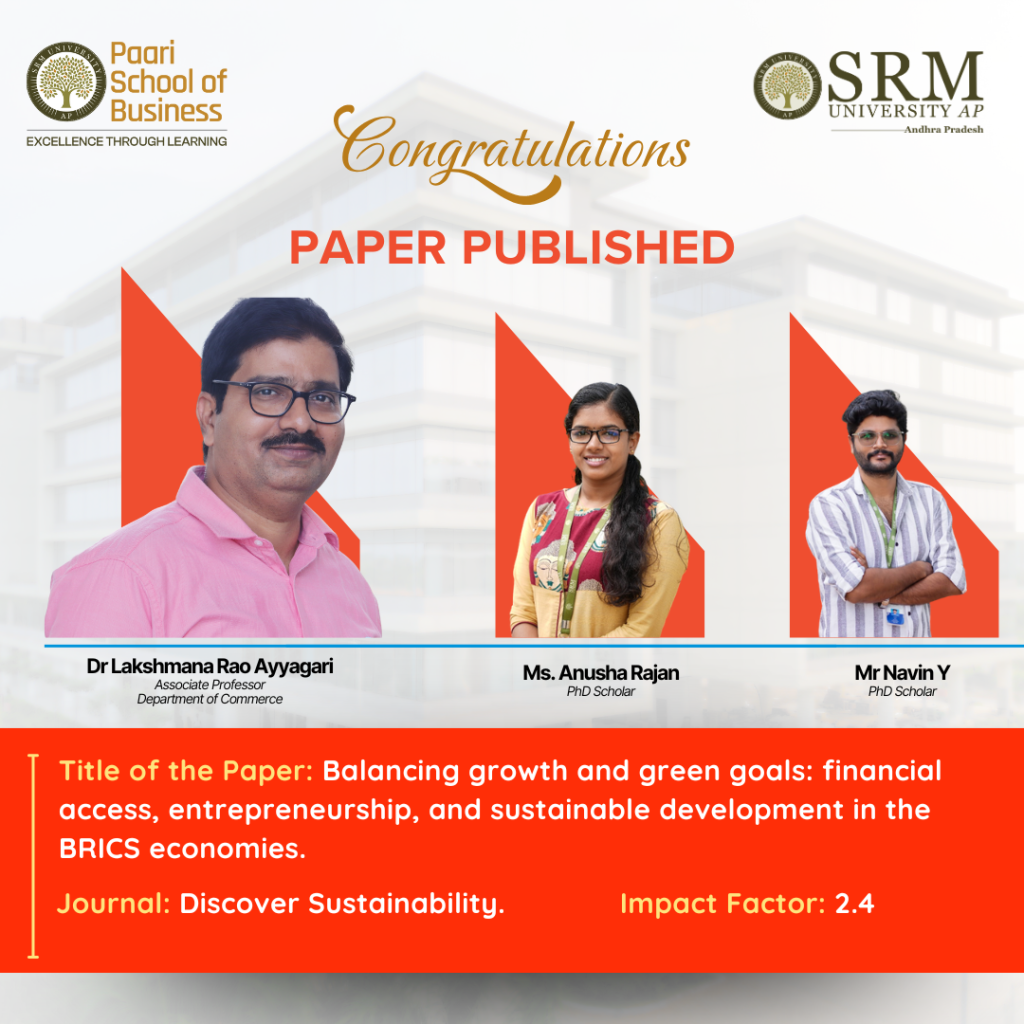 Imagine a world where economic growth of a society is done sustainably and with environmental care. Dr Lakshmana Rao Ayyagari, Assistant Professor, Department of Commerce, along with his scholars Mr Navin Y and Ms Anusha Rajan, has published an article “Balancing Growth and Green Goals: Financial Access, Entrepreneurship, and Sustainable Development in the BRICS Economies” in the Q1 journal Discover Sustainability, that looks at how countries like Brazil, Russia, India, China, and South Africa (BRICS) can support entrepreneurs without hurting the planet. The goal is to help governments, banks, and businesses grow responsibly by making sure financial tools support both money-making and environmental care.
Imagine a world where economic growth of a society is done sustainably and with environmental care. Dr Lakshmana Rao Ayyagari, Assistant Professor, Department of Commerce, along with his scholars Mr Navin Y and Ms Anusha Rajan, has published an article “Balancing Growth and Green Goals: Financial Access, Entrepreneurship, and Sustainable Development in the BRICS Economies” in the Q1 journal Discover Sustainability, that looks at how countries like Brazil, Russia, India, China, and South Africa (BRICS) can support entrepreneurs without hurting the planet. The goal is to help governments, banks, and businesses grow responsibly by making sure financial tools support both money-making and environmental care.Abstract
Financial access is a cornerstone of entrepreneurship and a key enabler of economic development. This study examines the dual role of financial systems in promoting entrepreneurial growth and sustainable development across BRICS nations (2000–2023). Using robust PLS-SEM analysis, the research reveals that while financial access drives business formation and economic resilience, it also poses ecological challenges through resource overuse and pollution. The findings highlight a paradox: the same financial mechanisms that foster progress can strain environmental sustainability. The study proposes actionable strategies to align finance with green development goals.
Practical Implementation / Social Implications of the Research
- Policy Impact: Informs BRICS governments to introduce green credit quotas, eco-tax incentives, and sustainability assessments in funding policies.
- Financial Sector Reform: Encourages banks to incorporate environmental risks into lending practices.
- Community Empowerment: Highlights the importance of inclusive entrepreneurship programs, especially for rural and marginalized communities.
- Sustainability Education: Provides a foundation for integrating sustainability into entrepreneurship curricula and public discourse.
Future Research Plans
- Explore the role of blockchain and AI in promoting transparent, sustainable financial systems.
- Investigate gender and social equity in sustainable entrepreneurship ecosystems.
- Conduct comparative studies on green finance policy innovations beyond BRICS (e.g., ASEAN or African Union).
- Develop longitudinal, mixed-methods frameworks to assess cultural, institutional, and digital factors in sustainability transitions.
Link to the Article
Continue reading → - Dr Lakshmana Rao and Team on Financial Access and Sustainable Development August 31, 2025
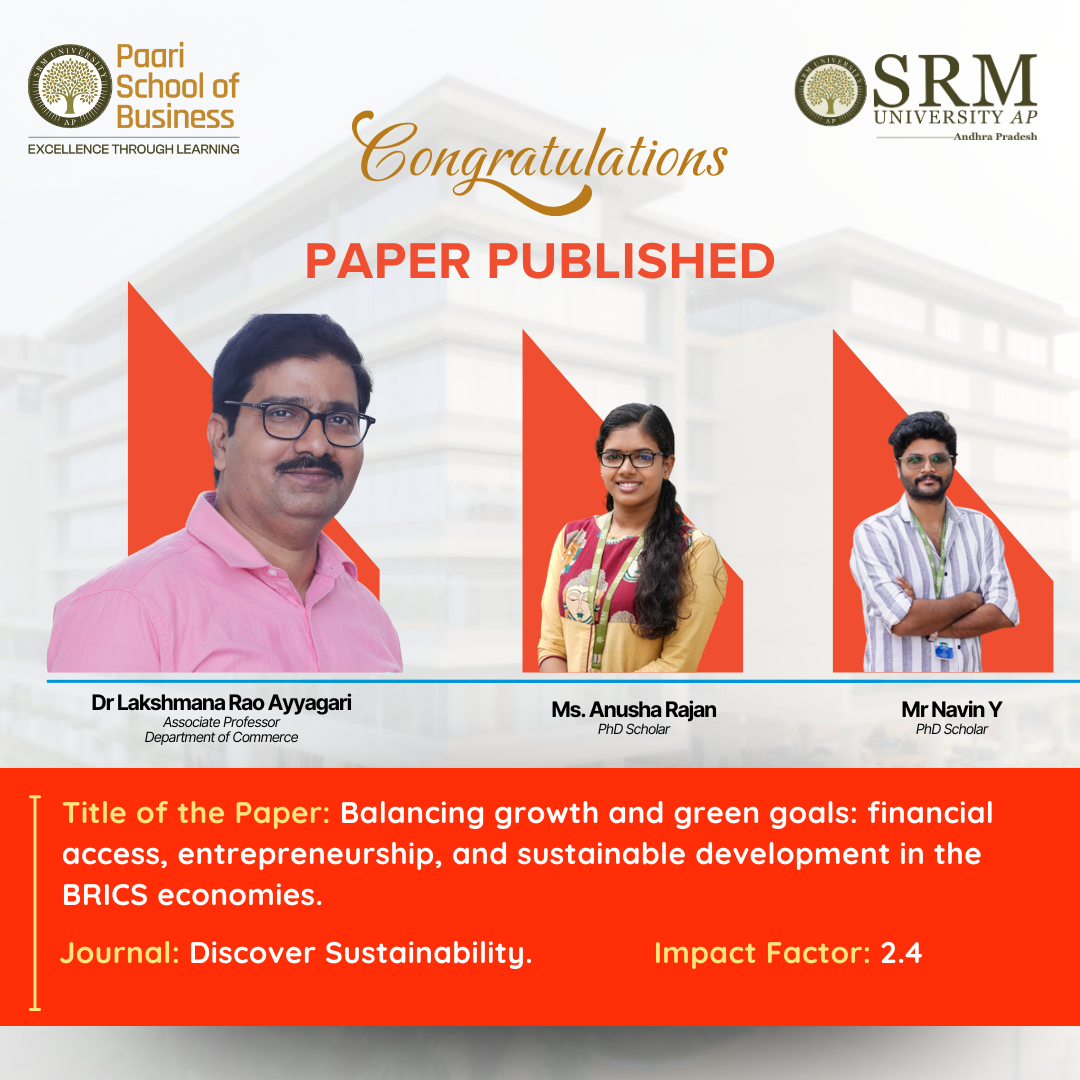 Financial access acts as both a catalyst and a challenge in today’s rapidly evolving economies. The research article “Balancing Growth and Green Goals: Financial Access, Entrepreneurship, and Sustainable Development in the BRICS Economies” by Associate Professor Dr Lakshmana Rao Ayyagari and his research scholars investigates this delicate balance between economic ambition and environmental responsibility. By applying robust PLS-SEM analysis over the period 2000-2023, the study conducted by the team at SRM AP uncovers the paradox of finance: it fuels entrepreneurship and development, while simultaneously straining sustainability goals.
Financial access acts as both a catalyst and a challenge in today’s rapidly evolving economies. The research article “Balancing Growth and Green Goals: Financial Access, Entrepreneurship, and Sustainable Development in the BRICS Economies” by Associate Professor Dr Lakshmana Rao Ayyagari and his research scholars investigates this delicate balance between economic ambition and environmental responsibility. By applying robust PLS-SEM analysis over the period 2000-2023, the study conducted by the team at SRM AP uncovers the paradox of finance: it fuels entrepreneurship and development, while simultaneously straining sustainability goals.The findings present a timely call for reimagining financial frameworks that not only strengthen economic systems but also safeguard ecological balance. The research offers actionable insights for policymakers, financial institutions, and communities- pointing towards a future where financial access empowers entrepreneurs without compromising green development.
Abstract
Financial access is a cornerstone of entrepreneurship and a key enabler of economic development. This study examines the dual role of financial systems in promoting entrepreneurial growth and sustainable development across BRICS nations (2000–2023). Using robust PLS-SEM analysis, the research reveals that while financial access drives business formation and economic resilience, it also poses ecological challenges through resource overuse and pollution. The findings highlight a paradox: the same financial mechanisms that foster progress can strain environmental sustainability. The study proposes actionable strategies to align finance with green development goals.
Explanation in Layperson’s Terms
Imagine giving people better access to banks and loans- it helps them start businesses and grow the economy. But, if those businesses use too many natural resources or pollute the environment, growth becomes harmful. This research looks at how countries like Brazil, Russia, India, China, and South Africa (BRICS) can support entrepreneurs without hurting the planet. The goal is to help governments, banks, and businesses grow responsibly by making sure financial tools support both money-making and environmental care.
Practical Implementation of the Research
- Policy Impact: Informs BRICS governments to introduce green credit quotas, eco-tax incentives, and sustainability assessments in funding policies.
- Financial Sector Reform: Encourages banks to incorporate environmental risks into lending practices.
- Community Empowerment: Highlights the importance of inclusive entrepreneurship programs, especially for rural and marginalized communities.
- Sustainability Education: Provides a foundation for integrating sustainability into entrepreneurship curricula and public discourse.
Future Research Plans
- Explore the role of blockchain and AI in promoting transparent, sustainable financial systems.
- Investigate gender and social equity in sustainable entrepreneurship ecosystems.
- Conduct comparative studies on green finance policy innovations beyond BRICS (e.g., ASEAN or African Union).
- Develop longitudinal, mixed-methods frameworks to assess cultural, institutional, and digital factors in sustainability transitions.
- Paari School of Business Launch Two New B.Com. Specialisations February 21, 2025
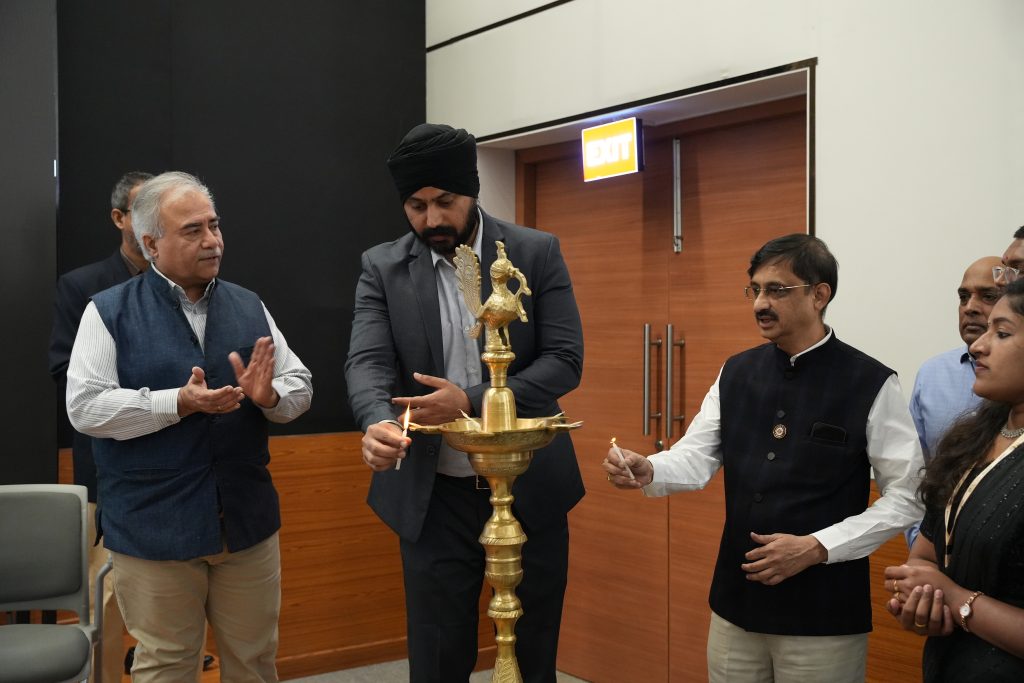
Marking a significant stride towards expanding academic offerings and equipping students with the skills required for the evolving business landscape, The Paari School of Business at SRM University-AP has launched two new specialisations for its B.Com. programme – B.Com. (CA Integrated) and B.Com. (Fintech and Banking).
The event witnessed the presence of stalwarts from Banking, Data Analytics and Chartered Accountancy along with the Vice Chancellor of SRM University-AP, Prof. Manoj K Arora, Registrar Dr R Premkumar, Dean-Paari School of Business, Prof. Bharadhwaj Sivakumaran, Head-Department of Commerce Dr A Lakshmana Rao, faculty, staff and students from the school. Mr Ruhbir Singh, CEO of Tatvic, a Global Analytics Firm, was the Chief Guest; Mr Bala Iyer, MD of Barclays Bank, was the Guest of Honour, and CA Ravi Kishore, President of ICAI Vijayawada Branch, was the Keynote Speaker.
Vice Chancellor Prof. Manoj K Arora appreciated the school for its launch of specialisations that will generously benefit the management education offered at the university. Dean Prof. Bharadhwaj briefly spoke on the objective of launching the two new specialisations and the expected outcome of the B.Com. programme. “At Paari School of Business, we offer modern, contemporary, and cutting-edge programmes that meaningfully align with current market demands. The curriculum of the two new specialisations is tightly integrated with the Fintech and CA fields and will be taught by industry experts and seasoned professionals,” stated Prof. Bharadhwaj in his welcome address.
This initiative by the Paari School of Business invokes innovation, inspiration, and excellence. In his address, Mr Ruhbir Singh, a pioneer in Digital Marketing and Data Analytics, elucidated the strategies for making it big in the business frontier. He remarked, “Critical thinking, keeping abreast with technology, and learning to present yourself are the pivotal skills graduates must equip themselves with to sprint to high-impact placements.”
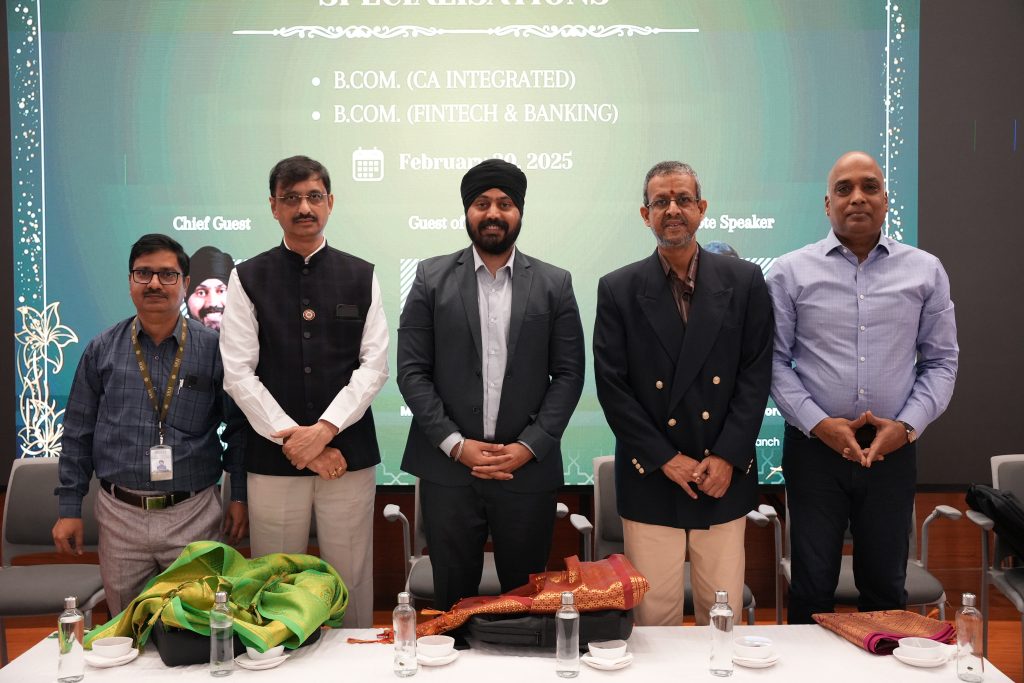
Guest of Honour Mr Bala Iyer emphasised the importance of networking and building connections among different strata of the business and economic fields as the real wealth that one must accumulate. In his keynote address, CA Ravi Kishore also underscored the significance of practical and soft skills accompanied by a mindset for continuous learning triumph over academic qualification in the real world. Both dignitaries launched the specialisations B.Com. (Fintech and Banking) and B.Com. (CA Integrated) respectively.
The event also witnessed the launch of the much-awaited two-day Business fest AMEYA’25 by the Chief Guest Mr Ruhbir Singh. AMEYA’25, the Management Mavericks’ Meet will hold numerous formal and informal events, ranging from Business Development to PR and Entrepreneurship, with a prize pool of Rs 1.75 Lakh. The fest will welcome students and participants from management colleges and universities in Vijayawada and Guntur. The event concluded with the felicitation of the esteemed dignitaries and a vote of thanks from the Head of the Commerce Department.
Continue reading → - Research Paper on ESG Scores and Their Effect on Polluting Companies After COVID-19 September 5, 2024
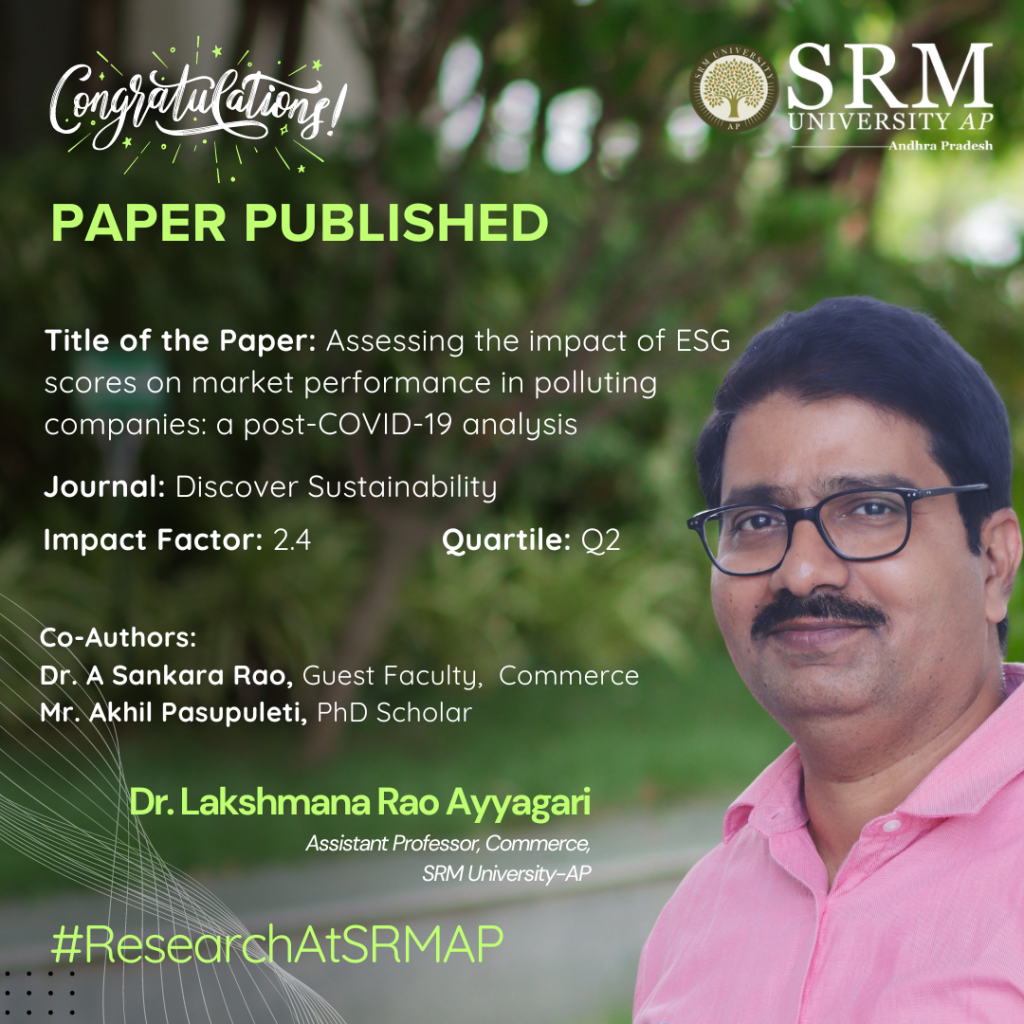
The Department of Commerce, under the Paari School of Business, is proud to present the research publication of Dr Lakshamana Rao Ayyangari, Guest Faculty Dr Sankar Rao, and Research Scholar Mr Akhil Pasupuleti. Their research paper, titled “Assessing the impact of ESG scores on market performance in polluting companies: a post-COVID-19 analysis,” is featured in the Q2 journal “Discover Sustainability.” Here is an interesting abstract of their research.
Abstract:
The study aims to unravel the impact of Environmental Social Governance (ESG) scores on the firm’s market performance of polluting companies. Moreover, the study also finds out the moderating effect of green initiatives. The study’s population consisted of 67 companies that were chosen from the list of polluting companies given by the Central Pollution Control Board of India for the post-COVID-19 timeframe of 2020–2023. The results indicate that the performance of ESG will improve the financial performance of the company.
Practical Implementation:
The analysis showed that companies with higher ESG scores generally perform better in the market. This means that firms that are more responsible in terms of environmental, social, and governance practices tend to do well financially. However, the study found that green initiatives did not have a significant impact on this relationship.
These findings are important for company managers and stakeholders. Understanding the connection between ESG practices and market performance can help managers create strategies to improve their ESG scores, ultimately boosting their financial performance.
Future Research Plans:
i) Focus on the R&D investment and sustainability.
ii) Studying the relationship between green finance and sustainability
iii) Exploring the relationship of CSR in sustainability
Continue reading →


